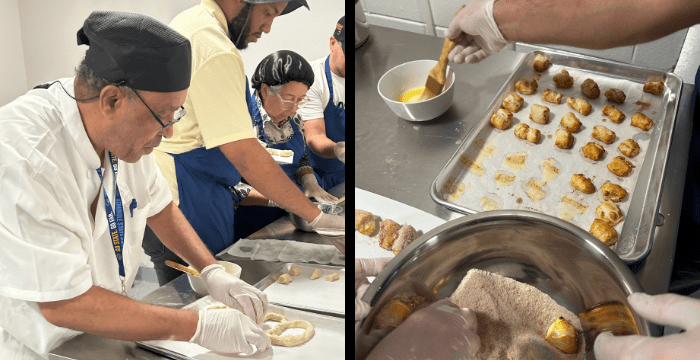SANFORD | Franklin Welch is a Navy veteran. Committed and loyal, he took care of his mother until she passed. Battling his own lymphatic cancer, he underwent chemotherapy and nearly died.
“I say I’m 7 years old because it was seven years ago. I started over, seriously, from the bone marrow out,” he recalled.
A family situation left him homeless. Then one day, he found himself near Pathways to New Hope in Sanford and applied to become a resident. Since his arrival, Pathways’ partnership with Seminole State College has been opening new doors and opportunities.
Pathways to New Hope, operated by Catholic Charities of Central Florida, is an affordable housing complex that works on a sliding scale. A full professional kitchen on campus facilitates a culinary course which provides a ServSafe® Food Handler certification to work in a restaurant kitchen. Through their Seminole State Commits program, they provide free non-credit, non-degree seeking courses and workshops to qualifying stu- dents referred by community partners, like Pathways.
Welch is one of those residents seizing these opportunities. “Homeless veterans have a stigma, but I was very fortunate to end up here,” said Welch who served four years on a Navy destroyer in the Mediterranean and around South America. Even after pre- paring 350 meals four times a day, he never received an official certification. So, when he learned about the culinary course offered on campus, he wanted to join.
“Now I am a certified food handler for the first time in my life, after all my experience. And I think it’s amazing,” he said. “It’s been a blessing to be here. I’ll be forever grateful. And the culinary is just like the whipped cream on the top of the whole thing.”
Tabbatha Maceda was Pathways second resident, along with two of her children. She moved to Florida to assist her father, who is blind, when his girlfriend fell ill. Once recovered, she and her kids moved out. She found a place but then lost her job. Unable to make ends meet, they became homeless for four months and landed at the nearby Rescue Mission where they learned about Pathways to New Hope.
She joined Welch in the first culinary class on campus. “I love to cook. I’ve been in the food industry almost all my life. Any kind of customer service, food, fast food, waitressing, whatever,” she said. Although she is currently not using her certification, she is seeking a job in the food industry and knows it will help.
Resident Darnell Hubbard also lived in a nearby shelter that directed him to Path- ways. He suffers from hereditary arthritis which attacks most of his body, making it difficult to get around, but he manages. He also struggles with addiction, which exacerbates his situation. Sober now for several months, he found hope again.
“You can go back and do the same thing, but you’re going to have the same results. That’s why I’m taking advantage of this program,” said Hubbard. “Staying sober, I’m happy because I’ve always wanted to be a chef. And even though I’m older and I have some difficulty, I still think that I could be a chef part-time.” He said cooking is his “niche”.
The culinary certification will enable him to earn a better wage and eventually move out. In the meantime, he’s also taking ad- vantage of computer and financial planning classes and making a life plan with Pathways director Joshua Weidenhammer to ensure success. “Honestly, I do not want to be homeless again. I don’t want to be in that predicament,” Hubbard said. “It’s a blessing because of where I was at the time. Everybody doesn’t look at this opportunity for what it is. I do. I just look at everything offered. And Josh is tremendous. He helps me in every direction. Sometimes you need that. It helps you develop yourself and grow in every aspect.” Hubbard said he also relies on prayer, “because nobody can help me more than God. I think God put me here.”
Weidenhammer has worked most of his adult life caring for people. After working with people with various disabilities, he said he looks at this challenge with a “therapeutic approach.” His main duty is case manage- ment. He said it is the social welfare aspect of the program he enjoys, “working on them with their goals, collaborating with them on their struggles … also coordinating vocation- al training, encouraging people and promoting the ministry in the community.”
He said, “I really enjoy meeting people in the darkness of their life.” Helping people during “the worst parts of their life come to a new place,” is what he feels it’s all about.
And he is quick to note Pathways to New Hope’s partnership with Seminole State helps it all come together. From facilitating the exploration of career opportunities, to getting some technical school, their GED, and even exploring interests like photography and music, Seminole State staff work hard to interview residents, determining what they could benefit from and encouraging them to participate.
To date nine Pathways to New Hope residents have graduated from the culinary pro- gram, with two of them graduating Aug. 26 and 27.
Weidenhammer wants people to know, “Pathways to New Hope is not just a reduced rent housing opportunity. You have somebody with a lot of experience and a lot of know-how that can navigate the system that’s here for you, and is in your corner,” he said. “I’m here for you to be a shoulder to cry on, a referral source, whatever it is.”
And the greatest reward for him is, “seeing (residents) want to participate in case management, want to participate in the free training and really take a shot at bettering their lives.”
To learn more about Pathways to New Hope please click here.
Watch more of the Culinary Program here.
By Glenda Meekins of the Florida Catholic staff, August 27, 2025

